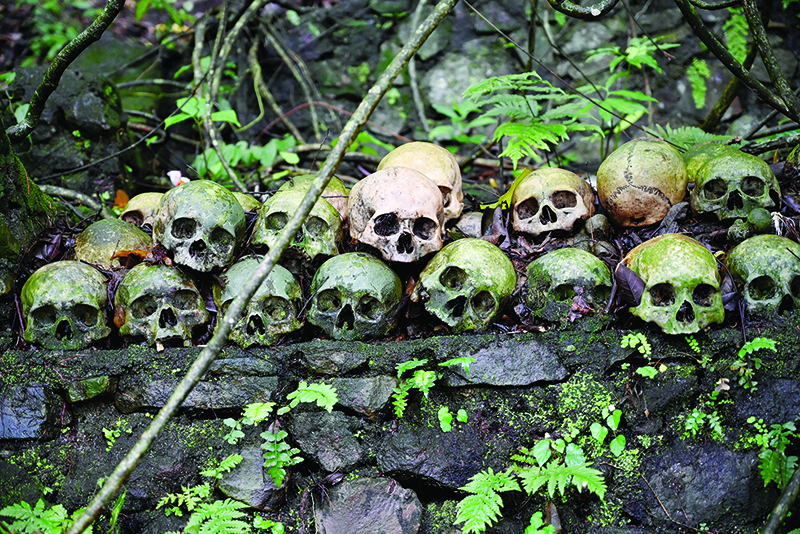

TRUNYAN: For centuries Bali’s Trunyanese people have left their dead to decompose in the open, the bodies placed in bamboo cages until only the skeletons remain. It is a ritual they haven’t given up - even as the COVID-19 pandemic upends burial practices worldwide with religious leaders in protective gear, cemetary workers in hazmat suits, and mourners banned or unable to comfort each other because of social-distancing rules.
Across Indonesia funeral workers are now required to wear protective equipment and bodies are laid to rest quickly, all in a bid to prevent the spread of the deadly respiratory disease. But in Bali local officials claim the novel coronavirus, which has infected at least eight million and killed more than 430,000 globally, has yet to reach the remote north east where the Trunyan live. "The funeral process remains the same but now we have to wear masks,” explained village head Wayan Arjuna. Tourists are temporarily banned from visiting for fear of them bringing in the disease, he adds.
"We’re afraid of getting COVID-19,” said Arjuna, but added there was no suggestion of stopping the open-air burial process. Unlike many in the rest of Hindu-majority Bali, the Trunyanese - who fuse animist beliefs and traditional village customs with their own interpretation of Hinduism - do not bury or cremate their dead. Instead they let nature take its course as the corpses decay in the open, believing it to be a way to keep a link with the deceased. "This makes us feel connected to our loved ones,” Arjuna said. "Like when my grandmother died, I felt like she was close”, he added.
Skull Island
It is a short boat ride to their open-air cemetery from tiny Trunyan village, overlooked by volcano Mount Batur and a sprawling Hindu temple carved out of volcanic rock. There are 11 cages for the corpses - placed close to a fragrant banyan tree that hides the putrid smell of death, locals say. In one cage, a recently deceased woman could almost have been mistaken for someone sleeping, but her waxy greying complexion revealed the truth. Nearby, a flesh-less foot poked out of clothing left on the bodies, while a skeletal jaw lay agape in another cage. "I used to be a little scared working here, but it’s been so long now that I’m used to it,” said veteran guide Wayan Sukarmin, who was spent 20 years showing people the custom on what outsiders have dubbed "Skull Island”.
When AFP visited in February before the World Health Organization declared a pandemic and travel restrictions were put in place, signs warned visitors to wear appropriate clothing and refrain from using bad language. Rubber sandals, cigarette packages, toothpaste tubes and pots and pans were scattered around the site, along with baskets filled with coins and crumpled money - all left by mourners for dead relatives to use in the afterlife. "Locals won’t take anything because it belongs to the dead. That’s our belief,” Sukarmin said. "I don’t know what the consequences would be if you took something but I believe in karma,” he added.
Millennia-old custom
If the cages become full then older corpses are moved to an open ossuary, to make way for new ones. Then when there is no flesh left, the skulls of the long dead are placed upon a stone altar, until they too crumble back into nature. Nearby, there is a second cemetery for the unmarried and children, while a third location is for those who died unnatural deaths like murder or passed away from acute illness. The Bali Aga - or mountain people - who live in these isolated villages, claim to be descendents of the original Balinese and the main temple in Trunyan village dates back to the 10th century according to historical records. The origin of the custom of open-air burials is subject to debate. One legend has it that the area’s early inhabitants fought over the prized Banyan tree, so to keep the peace, leaders decided to place the dead there, believing the smell from the corpses would make the spot less attractive.
Another story suggests that the ritual was adopted to avoid angering the rumbling volcano nearby by cremating people. "There are several versions of the legend so I can’t decide which one is correct,” Arjuna said. But these open-air burials are now so rooted in the culture that few expect much to change in Trunyan, even as the pandemic ravages the world. "It’s relatively easier to prevent infections in isolated and faraway places,” said Bali’s virus taskforce chief Dewa Made Indra. "There aren’t any reported cases in Trunyan. But if that happens then we’ll handle it with special procedures and I think the villagers will understand.” — AFP

